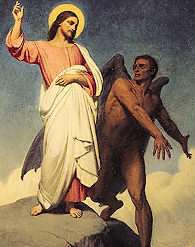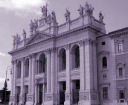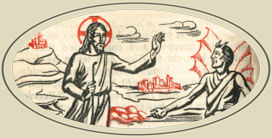from CatholicCulture.org:

Daily Readings for:February 26, 2012
Move to: Previous Day | Next Day

The most comprehensive treatment of the Liturgical Year available online: daily reflections, saints, seasons, calendars, prayers, activities, and recipes.

Daily Readings for:February 26, 2012
(Readings on USCCB website)
Collect: Grant, almighty God, through the yearly observances of holy Lent, that we may grow in understanding of the riches hidden in Christ and by worthy conduct pursue their effects. Through our Lord Jesus Christ, your Son, who lives and reigns with you in the unity of the Holy Spirit, one God, for ever and ever.
- Prayer for the First Week of Lent
- Lent Table Blessing 1
- Roman Ritual Blessing Before and After Meals: Lent (1st Plan)
- None
RECIPES
ACTIVITIES
PRAYERS
LIBRARY
Lent: February 26th

 First Sunday of LentOld Calendar: First Sunday of Lent
First Sunday of LentOld Calendar: First Sunday of Lent
Move to: Previous Day | Next DayThe scene of the temptation, which opens the public life of Jesus, declares in the Gospels in a very forceful manner the great change in our lives that He introduces into the world by His work of redemption. Where Adam fell, Christ, the new Head of humanity, triumphs over the power of Satan: at the time of His passion "the prince of this world" will be cast out. The Gospel of the temptation heralds Christ's victory.
Sunday Readings
The first reading is from the Book of Genesis 9:8-15 and is about the covenant between God and Noah not to destroy the world again by water.
The first reading is from the Book of Genesis 9:8-15 and is about the covenant between God and Noah not to destroy the world again by water.
The second reading is from the first letter of St. Peter 3:18-22. In this passage St. Peter is exhorting the newly converted Christians to live according to the Christian faith, no matter what trials they may have to endure because of it.
The Gospel is from St. Mark 1:12-15. The very thought of our divine Lord's suffering hunger, loneliness, and humiliation at the hands of his enemy—and that all this was for us—should make us feel ashamed at the little bits of suffering and humiliation we are willing to suffer for our own selves. He had no sin to atone for. He was making atonement for us and for our sins. He was the Son of God and his home was heaven, but he left it for a while to assume human nature, so that he could through his humiliations and sufferings bring us to share his eternal home with him. What is the thanks he gets from us? Ingratitude, forgetfulness, and even worse: insults and disobedience.
While the Church has eased the strict fastings and penances of Lent, we are still expected to do some private fasting and penance. It need not be fasting from food, but we can all do some daily penance which will help to keep our unruly minds and bodies in check while at the same time it will show that we are grateful to our loving Savior for all that he suffered for us. A few extra prayers each day, control of our temper in the home, less talk and especially less uncharitable talk among our neighbors, a little helping hand to a neighbor in need, a fervent prayer and where we can spare it (perhaps by doing without some luxury) a donation toward helping the starving millions in other lands. The sincere Christian will find a hundred such ways in which to thank and honor Christ during this holy season of Lent. We can all keep the last verse of today's reading before our minds with great profit. "Repent and believe in the gospel." This is the essence, the marrow, of Christ's teaching. Turn away from sin and come back to God. Anyone who believes in the gospel, who believes that there is an everlasting life after death prepared by God for all those who do his will while on earth, should not find it hard to give up offending that loving God who thinks so much of him. This life is only a passing shadow, every step we take, every breath we breathe is bringing us nearer to our earthly end and to the grave. But the believing Christian knows the grave is not the end. Rather, is it the beginning of the true life—provided we use this passing shadow, these few years, properly.
The sincere Christian will find a hundred such ways in which to thank and honor Christ during this holy season of Lent. We can all keep the last verse of today's reading before our minds with great profit. "Repent and believe in the gospel." This is the essence, the marrow, of Christ's teaching. Turn away from sin and come back to God. Anyone who believes in the gospel, who believes that there is an everlasting life after death prepared by God for all those who do his will while on earth, should not find it hard to give up offending that loving God who thinks so much of him. This life is only a passing shadow, every step we take, every breath we breathe is bringing us nearer to our earthly end and to the grave. But the believing Christian knows the grave is not the end. Rather, is it the beginning of the true life—provided we use this passing shadow, these few years, properly.
 The sincere Christian will find a hundred such ways in which to thank and honor Christ during this holy season of Lent. We can all keep the last verse of today's reading before our minds with great profit. "Repent and believe in the gospel." This is the essence, the marrow, of Christ's teaching. Turn away from sin and come back to God. Anyone who believes in the gospel, who believes that there is an everlasting life after death prepared by God for all those who do his will while on earth, should not find it hard to give up offending that loving God who thinks so much of him. This life is only a passing shadow, every step we take, every breath we breathe is bringing us nearer to our earthly end and to the grave. But the believing Christian knows the grave is not the end. Rather, is it the beginning of the true life—provided we use this passing shadow, these few years, properly.
The sincere Christian will find a hundred such ways in which to thank and honor Christ during this holy season of Lent. We can all keep the last verse of today's reading before our minds with great profit. "Repent and believe in the gospel." This is the essence, the marrow, of Christ's teaching. Turn away from sin and come back to God. Anyone who believes in the gospel, who believes that there is an everlasting life after death prepared by God for all those who do his will while on earth, should not find it hard to give up offending that loving God who thinks so much of him. This life is only a passing shadow, every step we take, every breath we breathe is bringing us nearer to our earthly end and to the grave. But the believing Christian knows the grave is not the end. Rather, is it the beginning of the true life—provided we use this passing shadow, these few years, properly.Now is the time to take these words of Christ to heart. He is asking each one of us today, to repent and to believe the gospel, that is, to act according to its teaching. Christ, in his mercy, will make this appeal to men again and again, but will we be here to hear it? If we answer his appeal now and start living our Christian faith in all sincerity, we need not care when death calls us. It will find us ready to pass over to the future, happy, unending life.
— Excerpted from The Sunday Readings by Fr. Kevin O'Sullivan, O.F.M.
Things to Do:
- Begin praying the prayer for the first week of Lent.
- Make Pease Porridge (Split Pea Soup) for supper, a traditional dish for Sundays during Lent. Add some diced ham for more flavor and substance.
- Today's Gospel speaks of the temptation of Jesus after his forty days' fast in the desert. After you go to Mass, discuss this reading with your children, emphasizing that temptation itself is not a sin, but we must use the Word of God to combat it, as Christ did. Read the Catholic Encyclopedia's explanation of the Temptation of Christ.

The Station today is at St. John Lateran. The Lateran is comprised of the Basilica, the Pontifical Palace and the Baptistry. The church is dedicated to the Christ the Savior. In the fifth century the titles of St. John Baptist and St. John the Evangelist were added. The Papal altar contains the wooden altar on which St. Peter is said to have celebrated Mass. This basilica is the mother of all churches and is the only church which has the title of Archbasilica.
Commentary for the Readings in the Extraordinary Form:
First Sunday of Lent
 "Not by bread alone does man live, but by every word that comes forth from the mouth of God" (Gospel).
"Not by bread alone does man live, but by every word that comes forth from the mouth of God" (Gospel).
First Sunday of Lent
 "Not by bread alone does man live, but by every word that comes forth from the mouth of God" (Gospel).
"Not by bread alone does man live, but by every word that comes forth from the mouth of God" (Gospel).1. In this picture the devil points to the bread of fleshly desire. "Now is the acceptable time" to "ration" our self-indulgence, our worship of physical culture (Epistle), and to feed our souls with the Divine Word. This temptation calls for the mortification of self.
2. The "pinnacle of the temple" (in the upper left corner), recalls the pride of usurping God's power, of trying to live beyond His reach. We must topple ourselves from the pinnacle of pride and lift ourselves up by prayer to the pinnacle of God Himself.
3. The "kingdoms of the world," seen in the distance (in middle of picture), represent those who covet mere earthly "glory." To offset this temptation there must be almsgiving or devoting one's talents to the service of one's neighbor.
The Epistle exhorts us not to receive "in vain" this plan of personal reformation, first by warning, then by encouraging us in the eternal struggle between Christ and Antichrist.
Excerpted from My Sunday Missal, Confraternity of the Precious Blood

No comments:
Post a Comment